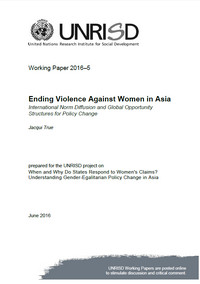Fuente UNRISD / 20 de junio de 2016
Violence against women (VAW) is only beginning to be recognized as a major societal problem within and across Asia. This is evidenced by the high level of self-reporting by men and women of sexual violence and domestic violence in recent UN surveys; the extremely low conviction rates for these forms of violence; the slow, partial or non-adoption of anti-VAW laws; and the lack of a regional anti-VAW Convention in Asia.
This UNRISD working paper explores how the global context of norm diffusion, state ranking, conflict and advocacy networking affects societal and policy change in the region to strengthen women’s rights. It highlights the increased visibility and reporting of VAW as a result of international norm diffusion particularly via the UN Convention on the Elimination of All Forms of Discrimination against Women (CEDAW) and the pressure exerted by intergovernmental organizations on governments to address VAW. It argues that non-state actors, especially global media and regional advocacy networks, have energized the push to end the culture of impunity for VAW. In combination, these transnational forces are radically altering the policy environment in Asia, making it non-negotiable for governments to respond to VAW and halt the slow progress to date in achieving women’s rights to bodily integrity.
Jacqui True is Professor of Politics and International Relations and an Australian Research Council Future Fellow at Monash University, Australia.






 Users Today : 9
Users Today : 9 Total Users : 35460466
Total Users : 35460466 Views Today : 12
Views Today : 12 Total views : 3419307
Total views : 3419307